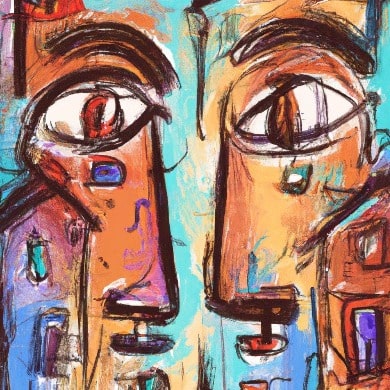|
This blog post was reviewed and approved for publication by Anjuli M. Shah D.O., a Board-certified psychiatrist at Apraku Psychiatry.
We’ve all seen them as we scroll through our TikToks and Instagram feeds — the sun-kissed celebrities and super-sculpted fitness influencers. With social media awash with seemingly ‘flawless’ bodies and exaggerated features, it can be challenging not to compare ourselves to these idealized standards.
The impacts of such constant exposure and comparison can be varied, ranging from lowered self-esteem to body dysmorphia, a mental health disorder characterized by an obsessive focus on perceived flaws in appearance. While social media is not the sole cause of body dysmorphia, research suggests it can contribute substantially to the condition. It’s crucial to remember, though, that not everyone who uses social media develops body dysmorphia. Individual psychological factors, genetics, and environmental influences also play a significant role. In this article, we’ll guide you through the influence of social media on body image perception, what BDD is and how it manifests, and strategies to help your mind and body while consuming social media in the future. Social Media and the Culture of ComparisonSocial media has become a dominant force in our lives, shaping how we communicate, interact, and perceive both ourselves and others. For many, social media platforms are an integral part of daily life, a place for connection, entertainment, and information. However, these platforms also present an often unattainable standard of beauty and physical perfection. Users are inundated with flawless images, artificially enhanced by filters and photo editing tools. In this context, it's easy to fall into the trap of constant comparison, analyzing how your own appearance stacks up against those seen in perfectly curated feeds by influencers whose full-time job is often maintaining the ‘ideal’ image. The comparison is almost never favorable, leading to feelings of inadequacy and a skewed perception of reality. Research has shown that frequent use of social media is associated with higher levels of body dissatisfaction, negative mood, and eating disorder symptoms. Adding to this is the issue of cyberbullying and body shaming. Many people, particularly young individuals, encounter derogatory comments about their appearance on social media, which can damage their self-esteem and body image. The consequences can be even more pronounced for individuals with Body Dysmorphic Disorder. Top Highlights
Understanding Body Dysmorphic DisorderSocial media can fuel obsessive concerns over perceived flaws, leading to an intensification of Body Dysmorphic Disorder symptoms. Also known as dysmorphophobia, BDD is a mental health disorder in which a person becomes extremely preoccupied with what they perceive as flaws in their physical appearance. These perceived imperfections may be minor or even unobservable to others, yet to the person with BDD, they are highly prominent and cause significant distress. BDD is more than just a lack of self-esteem or dissatisfaction with one’s looks. It’s an obsessive-compulsive spectrum disorder, meaning it involves recurrent, distressing thoughts and repetitive behaviors. Individuals with BDD may spend hours each day worrying about their appearance, examining themselves in mirrors, seeking reassurance from others, or attempting to camouflage or fix their perceived flaws. According to the American Psychiatric Association, BDD affects up to 2.4% of the population, both men and women, and often starts in adolescence, a time when individuals are most susceptible to societal and peer pressure about their appearances. This disorder can severely affect your daily life, causing social isolation and difficulties at work or school, and it often co-occurs with other mental health disorders such as depression and anxiety. Navigating Social Media MindfullyAs social media continues to play a significant role in our daily lives, learning to navigate these platforms mindfully can be a powerful tool in mitigating the potential harms. Here are some strategies for mindful social media consumption: Curate Your FeedYou have control over the content you consume. If certain accounts or types of posts make you feel insecure or unhappy, unfollow them or limit their appearance in your feed. Replace them with body-positive accounts, those promoting self-love, and accounts aligned with your interests and hobbies. Limit Your Screen TimeSetting specific time limits for social media usage can help reduce constant exposure to potentially harmful content. Most smartphones and digital devices have features that allow you to track and limit your screen time. Practice Digital DetoxesDesignate specific days or periods during the day as social media-free time. Use this time to engage in activities that you enjoy and that promote your well-being, such as reading, exercising, or spending time with loved ones. Don’t CompareSocial media is a highlight reel where people often showcase their best moments or achievements. Comparing your daily life to these highlights can lead to dissatisfaction and unhappiness. Try to appreciate your journey and your unique attributes. Seek SupportIf social media is causing distress or contributing to body dysmorphia, consider seeking help from mental health professionals. They can provide you with strategies and treatments to help manage these feelings and promote self-acceptance. In the age of digital media, it's essential to remember that your self-worth isn’t defined by what you see on social media. By being mindful of how you interact with these platforms, you can foster a more positive relationship with your body image and overall self-esteem. Conclusion: Seeing Through the Social Media MirageWhile social media platforms can be sources of connection, they can also serve as catalysts for body image dissatisfaction and contribute to conditions like Body Dysmorphic Disorder. It’s vital, though, to understand that the effects vary widely among individuals, and many other factors play substantial roles. Protecting your mental health in the digital age doesn’t have to mean completely disconnecting. Instead, it involves adopting a mindful approach to your online activities. Avoid falling into the comparison trap: your journey is unique, so embrace your individual attributes rather than comparing them with often unrealistic portrayals online. If you are experiencing distress or concern over potential BDD symptoms, don’t hesitate to reach out for help. Mental health professionals can provide valuable strategies and treatments to help you navigate these feelings and foster self-acceptance. This blog post is brought to you by Apraku Psychiatry. Apraku Psychiatry is a private practice offering video appointments with Board-certified psychiatrists licensed in multiple states. More blog articles can be found here. To schedule an appointment with one of our psychiatrists, patients can complete the online booking form. This blog post was reviewed and approved for publication by Axeline Johnson M.D., a Board-certified psychiatrist at Apraku Psychiatry.
Psychiatric illnesses cross the boundaries of age, sex, religion, and culture. They are universal, indiscriminate afflictions that can affect anyone, anywhere. Yet, understanding and managing mental health often present distinct challenges, influenced significantly by an individual’s cultural and societal context.
Among Hispanic cultures, mental health emerges as a nuanced topic, woven with a unique set of intricacies and cultural facets. Despite some progressive shifts in recent years, a persistent stigma surrounding mental health lingers, often posing a substantial obstacle to individuals seeking help. This blog post delves into the complex world of mental health within Hispanic communities, shedding light on prevalent misconceptions, cultural nuances, and potential strategies to dismantle the mental health stigma. |
Copyright © Apraku Psychiatry 2024



